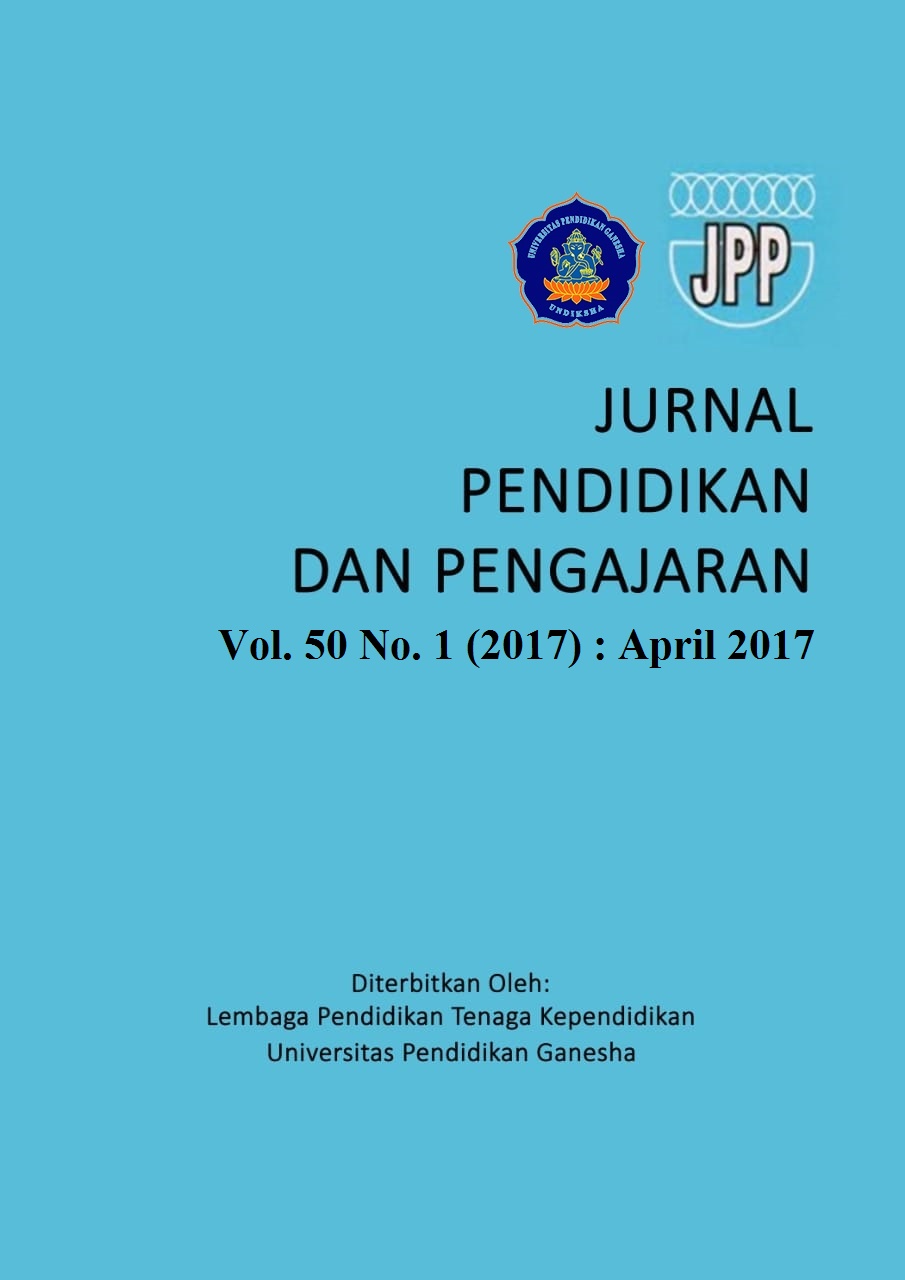THE INTEGRATION OF BALINESE LOCAL WISDOM INTO THE INFORMATION TECHNOLOGY SUPPORTED-GENERATIVE MODEL
DOI:
https://doi.org/10.23887/jpp.v50i1.10092Kata Kunci:
mathematical proving, generative model, local wisdom, Khan AcademyAbstrak
This research aimed at increasing students’mathematical proving ability through the implementation of the Generative Model based on local wisdom assisted by video learning on Khan Academy website. The subjects of this Classroom Action Research were 30 students in class II B of the Department of Mathematics Education Universitas Pendidikan Ganesha in the year of 2015/2016. This research was completed in 2 cycles with the steps of each cycle were planning, treatment action, observation and evaluation, and reflection. The data was analyzed descriptively. The result shows that the students’ mathematical proving ability was increased from the average 13.20 in enough category in cycle I to the average 15.83 in the high category in cycle II. Therefore, the implementation of generative model based on local wisdom assisted by video learning in Khan Academy website increase the students’ mathematical proving ability.Referensi
Abdullah, I. H. (2016). Berpikir kritis matematik. Delta-Pi: Jurnal Matematika dan Pendidikan Matematika, 2(1).
Gita, I. N., Ardana, I. M., Mahayukti, G. A., & Pujawan, I. G. N. Pengembangan nondirective teaching model berorientasi budaya lokal beserta perangkat pembelajaran matematika untuk siswa sekolah dasar di buleleng. Jurnal Penelitian dan Pengembangan Pendidikan, 5(3), 304-313.
Kuswari, H. (2015). Integrasi teknologi web 2.0 dalam pembelajaran matematika. In Prosiding Seminar Nasional Matematika dan Pendidikan Matematika. Jurusan Pendidikan Matematika FMIPA UNY.
Holil, A.(2008). Menjadi manusia pembelajar: pembelajaran generatif. [Online] Available: http://anwarholil.blogspot.com/2012/04/pembelajaran-generatif mpg.html. Accessed on 25 April 2017.
Kemmis, S., McTaggart, R., & Retallick, J. (2004). The action research planner.
Krathwohl, D. R. (2002). A revision of Bloom's taxonomy: An overview. Theory into practice, 41(4), 212-218.
Ikhsan, M., & Rizal, S. (2014). Meningkatkan kemampuan pemahaman dan komunikasi matematis siswa sekolah menengah atas melalui model pembelajaran generatif. Didaktik Matematika, 1(2).
Pongtuluran, A., & Rahardjo, A. I. (2000). Student-centered learning: the urgency and possibilities. Surabaya: Universitas Kristen Petra.
Soebagyo, J. (2016). Pemanfaatan web Khan Academy dalam pembelajaran matematika. Infinity Journal, 5(1), 50-55.
Sudiana, I. M., & Sudirgayasa, I. G. (2015). Integrasi kearifan lokal bali dalam buku ajar sekolah dasar. Jurnal Kajian Bali (Journal of Bali Studies), 5(1).
Sugiarta, I M. & Pujawan, IGN. 2011. Pengembangan model pembelajaran matematika berdasarkan kearifan lokal masyarakat Bali “Nyepi dan Tri Kaya Parisudha” untuk meningkatkan kualitas pembelajaran matematika mahasiswa SD di Propinsi Bali. Research Report. Singaraja : Undiksha.
Sugiarta. 2013. Implementasi model generatif berbasis kearifan lokal untuk meningkatkan hasil belajar matematika mahasiswa pada mata kuliah Analisis Real. Research Report. Singaraja: Undiksha.
Suja, I W. (2010). Pengembangan buku ajar sains SMP mengintegrasikan content dan context pedagogi budaya Bali. Jurnal Pendidikan dan Pengajaran, 43(1).
Tytler, R. (1996). Constructivism and conceptual change views of learning in Science. Khazanah pengajaran IPA, 1(3), 4-20.
Unduhan
Diterbitkan
Cara Mengutip
Terbitan
Bagian
Lisensi
Authors who publish with Jurnal Pendidikan dan Pengajaran agree to the following terms:- Authors retain copyright and grant the journal the right of first publication with the work simultaneously licensed under a Creative Commons Attribution License (CC BY-SA 4.0) that allows others to share the work with an acknowledgment of the work's authorship and initial publication in this journal
- Authors are able to enter into separate, additional contractual arrangements for the non-exclusive distribution of the journal's published version of the work (e.g., post it to an institutional repository or publish it in a book), with an acknowledgment of its initial publication in this journal.
- Authors are permitted and encouraged to post their work online (e.g., in institutional repositories or on their website) prior to and during the submission process, as it can lead to productive exchanges, as well as earlier and greater citation of published work. (See The Effect of Open Access)





